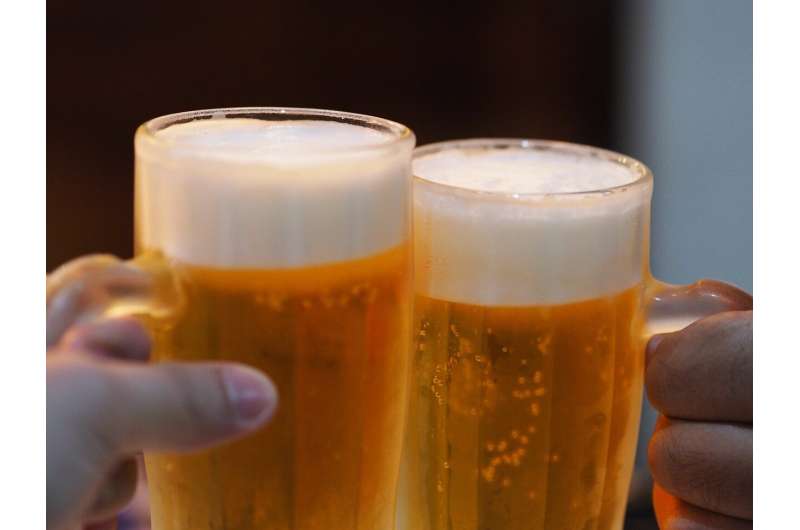November 2, 2022 feature
Exploring the role of social contexts on neural processes underpinning alcohol consumption

The abuse of alcoholic beverages can increase the risk of numerous serious mental and physical health problems, including addiction, liver diseases, heart disease, strokes, and cancer. Identifying cues and contexts that promote alcohol consumption, as well as the neural processes involved in relapses or excessive drinking, could ultimately help to develop more effective treatments for alcohol addictions, consequently preventing some patients from developing these health conditions.
Researchers at University of Amsterdam have recently carried out a study investigating how the brain of social drinkers responded to cues associated with drinking-promoting situations or venues, as they were sipping alcoholic or non-alcoholic beverages. Their findings, published in the Addiction Neuroscience journal, highlight the possible role of social contexts in promoting alcohol consumption and relapse among social drinkers.
"Our work builds on previous work on audio simulations of social contexts developed by the lab of Prof. Kristen G. Anderson," Helle Larsen, one of the researchers who carried out the study, told MedicalXpress. "We previously developed a Dutch culturally adapted version of audio simulations of social contexts, and the aim of this work was to investigate and validate a new multi-sensory social alcohol cue-reactivity task. So, essentially, we wished to understand which part of the brain would be activated and how would this relate to alcohol consumption."
People's social environments are known to play a crucial role in the development and escalation of alcohol abuse, as well as other addictions. Prof. Anderson, Larsen, Lauren Kuhns and their colleagues thus specifically set out to explore the impact of social contexts on alcohol-related activations in the brains of young adults who take part in social drinking.
"While in an fMRI scanner, participants listened to audio simulations of social contexts in which drinking is typical (e.g., a conversation at a birthday party) and saw pictures of the social contexts, then received an offer of either water or beer written on screen," Larsen explained. "After the scanning and filling in some questionnaires, participants engaged in a social drinking session with another person who was actually an experimenter unbeknownst to the participant at the time."
During their experiment, Larsen and her colleagues collected fMRI data, which allowed them to understand what parts of the participants' brain where activated when they were exposed to the social context-related cues (i.e., audio recordings) and engaging in drinking behavior. In addition, they measured how much alcohol the participants drank in the presence of the "undercover" experimenter, who was either drinking or not drinking alcohol.
"Our findings demonstrate the complexity of social drinking situations and how difficult it is to disentangle the neuro- and psychological processes related to alcohol consumption," Larsen said. "They also emphasize the importance of social contexts when understanding alcohol consumption. We found associations between alcohol use measures and brain activity during exposure to social contexts regardless of which drink they were offered, indicating that drinking-relevant social contexts may act as phasic alcohol-relevant cues."
While several past studies showed that direct alcohol-related cues (i.e., seeing an alcoholic beverage, being offered a drink, etc.) can elicit cravings and increase the risk of relapses in people who are addicted to alcohol, the possible effects of cues associated with social context alone on alcohol consumption are not yet fully understood. Larsen and her colleagues found that their participants' alcohol cravings and brain activity associated with cravings were accentuated when they were presented with social context-related cues, regardless of whether they were offered water or a beer.
Overall, these findings suggest that some social contexts can make people feel like drinking alcohol, regardless of whether alcohol is consumed by others and if they are offered any. In the future, this interesting insight could potentially inspire the development of additional therapeutic tools for treating alcohol addictions, which also address possible cravings elicited by social contexts.
"It would now be interesting to investigate the processes we uncovered in people who are abstaining from alcohol as well as people who are heavy drinkers as the influence of social contexts may differ depending on drinking patterns," Larsen added.
More information: Helle Larsen et al, Social multi-sensory alcohol cue reactivity and ad libitum social drinking: An fMRI study, Addiction Neuroscience (2022). DOI: 10.1016/j.addicn.2022.100039
© 2022 Science X Network





















